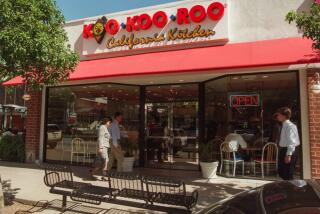Executive Shakeup at CPK
- Share via
Concerned about the company’s aggressive expansion plans, the founders of California Pizza Kitchen Inc. resumed control of the restaurant chain Thursday as President and Chief Executive Frederick R. Hipp resigned.
California Pizza Kitchen said Hipp’s resignation was effective immediately and that Co-Chairmen Richard “Rick” Rosenfield and Larry Flax were assuming chief executive duties at the company they founded in 1985.
During a conference call with investors and analysts, Rosenfield said California Pizza Kitchen’s focus on meeting specific expansion targets was worrisome and expressed concern that the growth strategy had forced the company to select sites in sparsely populated areas, or “at the back of a mall,” which didn’t perform well.
Hipp wasn’t available for comment.
The Los Angeles-based company lowered its earnings estimates for 2003 and said it would scale back the number of new store openings.
The news, released after the market closed, sent shares down as much as 20% in after-hours trading.
The company also reported second-quarter net income, which was flat at $4.4 million, or 23 cents a share, compared with $4.3 million, or 23 cents, a year earlier.
The results beat the 22-cent estimate of analysts surveyed by Thomson First Call. Revenue rose 16.2% to $87.9 million in the period ended June 29.
Though some newer stores -- particularly those in less dense, suburban areas -- struggled, overall the company saw same-store sales increase 2.3% in the quarter.
Hipp, 53, oversaw a major enlargement of the chain after he became CEO in January 1998, with the number of stores growing to 128 from about 70.
He had committed the company to an annual growth rate of about 20% and in April said the chain would open at least 22 restaurants this year, and 17 to 24 next year.
On Thursday, Rosenfield and Flax said they would stick with Hipp’s 2003 plan to open 22 new stores, but they lowered the 2004 goal to 10 to 12 stores.
“We’re not going to push exponential growth,” Rosenfield said during the conference call.
“Going into 2004 and thereafter, we are not going to let a specific growth rate dictate our strategy. We’re going to let the strategy dictate our growth rate.”
In the second quarter, average weekly sales for full-service, company-owned restaurants were $55,405, down 2% from $56,631 a year ago. The drop was due in part to weaker sales in many of the stores opened within the last 18 months.
The company said its earnings estimate for the year was 88 cents to 91 cents, down from the previous guidance of about 98 cents. It said the chain could face one-time charges for restaurant closures.
The company said its estimate for 2004 was $1.05 to $1.10 a share -- below analysts’ consensus estimate of $1.20.
In after-hours trading, California Pizza Kitchen shares fell as low as $16.50 after closing at $20.16 in regular trading on Nasdaq.
“The market hates uncertainty, and there are two things here that are uncertain,” said Mike Smith, who tracks the stock for Fahnestock & Co. “You don’t know what the charges are going to be and you don’t know how many restaurants they’re really going to open.”
In recent months, Rosenfield and Flax had turned their attention to creating a new type of restaurant chain and had opened in June an eatery called LA Food Show in Manhattan Beach, an upscale bar and grill that the two hoped to expand into several more stores and integrate into CPK’s operations.
However, Rosenfield said that now that he and Flax have to refocus on California Pizza Kitchen, they may move those plans up. CPK Inc. is a minority investor in the new restaurant concept.
On Thursday, the company named H.G. “Carey” Carrington Jr., the chief financial officer from 1998 to 2001, as interim president.
Hipp, who also resigned his board seat, had come to California Pizza Kitchen from Houlihan’s Restaurant Group, a Kansas City, Mo.-based chain, where he was president and CEO.
Thursday marked the second straight financial report to disappoint investors. In April, after the first-quarter numbers were announced, the stock tumbled more than 17% after at least four analysts downgraded the company on disappointing earnings news.
More to Read
Inside the business of entertainment
The Wide Shot brings you news, analysis and insights on everything from streaming wars to production — and what it all means for the future.
You may occasionally receive promotional content from the Los Angeles Times.










